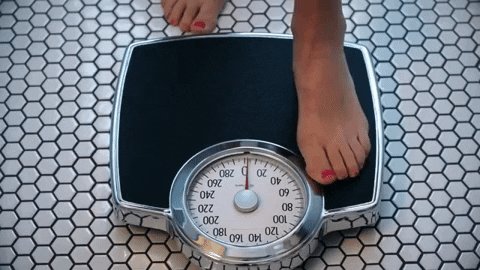
Published on Jul 16, 2024
Last modified on Sep 18, 2024
Are Weight Loss Drugs Safe & Effective For Menopause? (Ozempic, Wegovy, etc…)
6 min read

Odds are you’ve heard about weight loss medications like Ozempic and Wegovy…they’re popping up everywhere from social media feeds to subway ads. But what exactly are these GLP-1s? How do they work? And most importantly, are they safe and effective for menopausal women? We’re answering these frequently asked questions below.
Back to basics: what even ARE GLP-1s?
The two predominant incretin hormones are Glucagon-like peptide-1 (GLP-1) and Glucose-dependent insulinotropic peptide (GIP). Our gut naturally releases incretin hormones (GLP and GIP) when we have a meal. GLP-1 stands for glucagon-like Peptide-1 receptor agonists (GLP-1 RA)…a total mouthful, we know. They mimic the action of the hormone GLP-1. It’s a family of medications currently approved by the FDA for the treatment of Type-2 Diabetes.
So why are we talking about them as weight loss drugs? In certain cases, they can be prescribed for obesity.
The list of GLP-1s is LONG and includes generic medications such as:
- Semaglutide (Ozempic, Wegovy)
- Exenatide
- Lixisenatide
- Liraglutide (Saxenda)
- Albiglutide
- Dulaglutide
- Trizepatide (Mounjaro)
Ozempic and Wegovy, arguably the two most popular at the moment, are semaglutides. Ozempic was FDA-approved in 2017 for Type-2 Diabetes while Wegovy was approved in 2021 for obesity.
At the moment, almost all GLP-1s are injectable (there is one oral GLP-1 currently available, but it’s only approved for diabetes). There are, however, other oral GLP-1s in development.
How do GLP-1s work?
GLP-1 itself is a hormone that stimulates the release of insulin. This is precisely why GLP-1s are used for diabetes — because insulin helps blood sugar get into our body’s cells to then be converted into energy.
When it comes to weight loss, GLP-1s work by slowing down the movement of food from the stomach into the small intestine (called “gastric emptying”). The result? Feeling fuller, longer.
RELATED: Appetite Through The Roof During Menopause? You’re Not Alone.
Why are they all the rage right now?
We’re hearing so much about GLP-1s partially because of the amount of weight people supposedly lose when taking them.
According to a March 2021 study published in The New England Journal of Medicine, adults taking a weekly 2.4 mg dose of semaglutide over 68 weeks (roughly 15 months) lost 15% of their body weight (an average of 35 pounds) compared to just 2.4% body weight loss for the placebo group.
Can anyone looking to lose weight take GLP-1s?
It’s important to note that the FDA hasn’t yet approved Ozempic specifically for weight loss (just for Type-2 Diabetes). That said, a healthcare professional may prescribe it off-label.
The FDA has approved Wegovy, however, and recommends it for chronic weight management if you meet one of the following criteria:
- BMI of 27 kg/m2 or higher AND at least one weight-related condition (e.g., high blood pressure, high cholesterol)
- BMI of 30 kg/m2 or higher
Those with the following conditions should avoid semaglutides:
- History of medullary thyroid cancer
- History of gallbladder disease
- History of pancreatitis
- History of severe gastrointestinal disease (gastroparesis, inflammatory bowel disease)
- History of thyroid conditions: multiple endocrine neoplasia 2A/2B, medullary thyroid cancer
- History of kidney disease/dysfunction
Perimenopausal women who are still of childbearing age should be on some form of contraception while taking GLP-1s. You should avoid or stop taking GLP-1s if you are breastfeeding, wish to become pregnant, or are currently pregnant.
Considering semaglutide? Be sure to consult with your primary care physician who can advise you based on your personal and family medical history — especially if you’re currently taking a diabetes medication and want to understand what drug combinations are safe.
What are the side effects of GLP-1 RAs?
The most common side effects include nausea, vomiting, diarrhea, and itching/redness at the injection site. Other side effects may include dizziness, headaches, mild increases in heart rate, and indigestion.
Anything else I should know about the safety of GLP-1s?
When purchasing drugs from an online pharmacy, it’s so so SO important to consult the FDA’s BeSafeRx site, which has resources and tools to help you make safer, more informed decisions. This is especially relevant for something like GLP-1s, which can come in compounded forms.
What this means is that the ingredients are combined, mixed, or altered to create a more tailored medication by a compounding pharmacy. Compounds are also used when there’s a shortage of a drug. The problem? The FDA does not verify the safety or effectiveness of compounds, and there have been adverse events reported after patients used compounded semaglutide (especially with salt forms of semaglutide: sodium and acetate).
Let’s talk $$: how much do GLP-1 medications cost?
Subcutaneous weekly injections of GLP-1 agonists can run you roughly $1,200 per month, with Ozempic costing approximately $10,000 per year. Needless to say, they’re not cheap.
Insurance coverage of these medications is a big issue. Some commercial insurers aren’t yet covering GLP-1s or may set their own guidelines (like requiring a BMI of 35 or above). And Medicare coverage typically does not cover weight loss medications at all.
What other weight loss medications are available?
GLP-1s aren’t the only options. There are six weight loss drugs that have been approved by the FDA for long-term use:
- Bupropion-naltrexone (Contrave)
- Orlistat (Xenical, Alli)
- Phentermine-topiramate (Qsymia)
- Setmelanotide (Imcivree)
There are other drugs that are used off-label for weight loss as well, like diabetes medication Metformin and Tirzepatide (Moujaro).
And there are more weight loss drugs in the pipeline, including retatrutide, which has been in the news lately after its Phase 2 trial results showed a 24% drop in body weight.
For more information, refer to our full guide to menopausal weight gain, which breaks down the relationship between estrogen levels and weight, and how hormonal changes can affect our bodies.
Okay, so I want to lose weight but I don’t want to go the medication route. What can I do?
🧘 Focus on stress management
Cortisol is a hormone our bodies use to respond to stress and regulate our immune response/metabolism. Levels of our stress hormone increase with age (and with stress, duh!). Chronically high levels can then lead to insulin resistance (see above), which can then lead to weight gain.
READ MORE: Everything You Need To Know About Anxiety and Menopause
😴 Focus on high-quality sleep
Poor sleep can cause hormonal fluctuations, including higher cortisol levels. Plus, because our bodies receive hunger signals from hormones such as ghrelin (increases our cravings) and leptin (causes feelings of satiety), a disrupted sleep cycle can lead to patterns of overeating. In fact, a study conducted by the American Heart Association found that people who slept an hour and 20 minutes less consumed 549 more calories than the control group.
READ MORE: Everything You Need To Know About Sleep Problems and Menopause
🍅 Go all-in on the Mediterranean diet
While there isn’t one best “healthy diet” for everyone, the Mediterranean diet has rightly earned a lot of hype for its positive effects on everything from mental health to weight loss. It’s low in saturated fats and cholesterol-rich animal proteins, rich in antioxidants and fiber, anti-inflammatory, low-carb, and low-sugar. And because it kicks most processed foods and refined sugars to the curb and focuses instead of non-starchy veggies, beans, fruits, and whole grains, it’s considered a “low-glycemic index” diet — meaning it won’t cause dramatic spikes in our blood sugar levels. Because remember, increased glucose leads to insulin resistance which increases insulin production, which leads to excess weight.
⏰ Consider intermittent fasting
Elektra’s founding physician, Dr. Anna Barbieri, MD, likes intermittent fasting (IF) for its numerous benefits — namely sugar control and weight loss — however, some see more benefits from it than others (yet another reason why diet isn’t one-size-fits-all). In order to see results, a 16:8 schedule is recommended, which means 16 hours of consecutive fasting during a 24-hour period. Fasting hours include sleeping hours, so many find this to be a doable schedule (for example, eat between the hours of 12:00PM – 8:00PM, and fast overnight until noon the next day). During the fast, you can have things that don’t raise insulin at all, like water, coffee, tea and fat (for example, coffee with butter).
READ MORE:
- The 101 On Intermittent Fasting During Menopause
- Elektra Guide to Nutrition During the Menopause Transition
- Yes, “Menopause Belly” Is Normal. Here’s What You Can Do About It.
💪🏾 Keep up the cardio, but don’t forget about strength training also
Aerobic physical activity that gets our heart rates up is not only important for our cardiovascular health; it also helps with sleep, cognition, mental health, and more. But it’s important to incorporate strength training during the menopause transition as well. Why? It helps us maintain muscle mass (which we naturally lose), it keeps our bones strong (which protects us from osteoporosis), and also helps with weight management and increasing our metabolic rate. Here are a few of our favorite strength training videos:
- Yoga For Upper Body Strength | Yoga With Adriene
- Strength Training and Toning Workout for Fat Loss | Fitness Blender
- 30-min Intense Mini Band Workout | Growingannanas
READ MORE:
💊 Be wary of (most) supplements for weight loss
There are lots of supplements and blends marketed to help you “get rid of belly fat.” Unfortunately, if they sound too good to be true, they likely are — weight loss (and overall wellness) is not found in a bottle. Some contain excessive amounts of caffeine, for example, which could cause side effects.
One exception is berberine, a plant-based supplement that’s very well studied and thought to be as safe and as effective as metformin in controlling both blood glucose and insulin sensitivity. Is it going to help you lose as much weight as Ozempic will? Probably not. But combined with the right diet and exercise, you will get the anti-inflammatory properties — and that insulin sensitivity will be helping you to move in the right direction.
If you consider any specific weight loss supplements, we recommend that you discuss with a healthcare provider.
READ MORE: Everything You Need To Know About Weight Gain and Menopause
A note on body neutrality
No article on body weight and women’s health would be complete without a mention of our thoughts on body neutrality.
Now you may be familiar with the Body Positivity movement, which encourages people to accept and celebrate all aspects of their appearance. While we appreciate that idea in theory, let’s be real: loving every part of your body can be incredibly difficult, especially if you’re experiencing menopause symptoms. Instead of focusing on appearance or striving for an unwaveringly positive self-image, body neutrality challenges us to recognize and respect how our bodies are supporting us in the present. Learn more about this incredibly powerful way of “reframing the change.”
Just as frustrating as weight gain during menopause are hot flashes and night sweats. Learn why it happens and what you can do about it.



